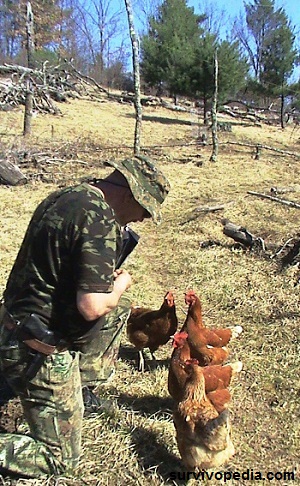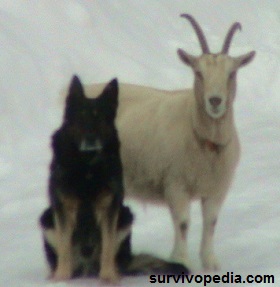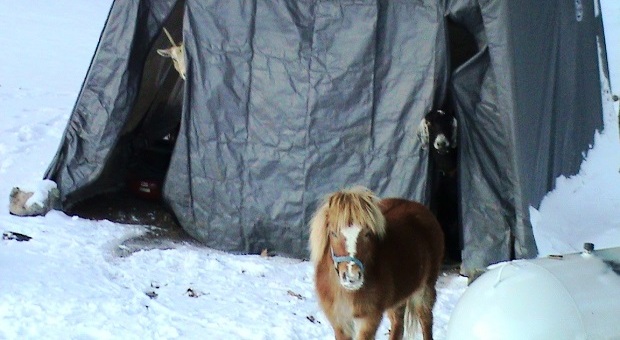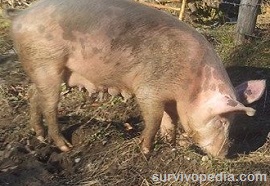It finally happened.
And briefly your mind flashes back to the old original ‘Planet of the Apes’ movie where at the end Charlton Heston is escaping on the beach and looks up in shock to see a half buried Statue of Liberty in the sand!
You now have the same sinking feeling in your gut that Heston portrayed then when he cursed mankind for its hell bent mission of eventually destroying civilization as we knew it.
But you were one of the fortunate ones who somehow knew it was coming sooner or later. You, and perhaps others close to you, prepared and had a small piece of land far enough away from the major human congestion and anarchy to be able to successfully avoid the chaos and carnage so prevalent during the long recovery period with the survival knowledge you accumulated.
You planned and studied carefully and had the foresight to include certain animals that provided valuable benefits for your new off grid self-sustaining lifestyle. But which humble creatures did you choose, and why? Well, although it’s not rocket science there are some considerations for minimalist preppers, as compared to general farming and live-stock ranching for profit.
{adinserter survivalmd}The list here in order of importance may surprise some.
But when you think about it, you’ll see the sense of a pragmatic situational analysis as opposed to one’s personal preference which might not be sustainable–and could even become a liability–in the greater survival schema.
The following represents the basic amount of animals which would provide the maximum amount of diverse value, while providing a starting point for expansion and support of further food production husbandry if desired and feasible.
1. Chicken and Geese

Spec Op Hens Briefing On “Al-Qoyote Terrorists”
Yes, the cold hard reality in a serious survival situation is that if you could only have one animal, it would be the lowly, pusillanimous, and too often taken for granted, chicken. They provide two of the first and foremost essentials in the life of a prepper: food and cost effectiveness.
4 or 5 healthy laying hens each produce an egg almost daily. That’s actually enough to keep two people alive almost indefinitely if you don’t have much else to eat.
Contrary to what specious agenda based cholesterol medication profiteers say, eggs–especially from free ranged/organic birds–are one of the most wholesome foods available.
Chicks are amazingly cheap to buy–generally less than a couple inflated dollars–apiece depending on what kind. And adults are low maintenance and don’t require a lot of inside space because they prefer to be outside more often than not to do their scratching and pecking and mostly go in their coop only at night to nest.
So a half dozen or so birds in a 50×50 foot chicken wire corral with a small coop would thrive. Throw in a handful of good non-GMO organic feed once a day or so and treat them occasionally with your table scraps and they’ll pay for themselves in only a couple weeks of daily fresh organic eggs once they begin laying.
Chickens are much smarter than you think. They communicate and can be trained. They like to be held and petted and are an excellent way to teach kids responsibility, care, and appreciation for the smaller creatures of creation. For the most part they are quiet and peaceful but will certainly ‘alert’ to danger with a noticeable squawking while they quickly depart from the source of trepidation.
There are volumes written on raising these little ‘scratch and peckers’ and their usefulness. They’ll even agree to donate some real feather fetching if you run out of duct tape for your home made arrows for your DIY PVC bows.
Another bird species that also has potential egg production value but also provides an interesting side benefit are geese. Most people don’t associate geese with personal or livestock protection but historically that has been a benefit of ownership. The most famous exemplary being in 390BC where Rome was alerted by an astutely observant pair of geese in time to prevent a surprise attack from invading troops from Gaul.
Geese are natural perimeter protectors and a good early warning system for any strange occurrence or intruders. Yes, even better than most dogs comparatively speaking.
Dogs primarily rely on their super sense of smell, then hearing, and finally vision to be alerted to incoming danger. Geese primarily rely on an acute sense of visual abilities that include high powered focus and ability to detect ultraviolet light. They can spot things and movement even at night that is beyond a dog’s, or human’s capacity. In parts of China’s Xinjiang province the police/military use Geese as night guards at the checkpoints.
Geese are one of the most territorial animals and once they establish that territory, they proactively patrol and protect it as a major daily activity. They move in a group and are usually quiet until they sense something abnormal. Once they hone in on an ‘intruder’ they ‘stand their ground’ and act like a motion detecting alarm system making an identifiable loud noise and they can’t be distracted even by food bribes.
If the ‘intruder’ fails to retreat the larger species of geese will often chase and gang up on the invader and attack, including humans they’re not familiar with. This is where the expression ‘getting goosed’ comes from. They tend to peck at the area between the legs!
Geese have been traditionally used in Europe where sheep herding is popular to help protect the flocks from wild dogs, foxes, and human poachers.
2. Goats
Contrary to popular mythology, goats do not eat anything and everything and do not prefer living in Hill Billy junk yards. They actually are quite particular about what they eat, and they are naturally green grass grazers. It’s just that many expensive landscaping trees and vegetable plants and prize flower beds happen to be what they’re ‘particular about’ eating when the opportunity presents itself.
Natural goat’s milk is molecularly ’different’ from any other milk and is the healthiest of dairy products, even if you are lactose intolerant. One milking goat added to your corral to compliment your ’egg ladies’ would emergency sustain you through the worst of times. Not to mention that goat cheese is easy to make and nutritionally regarded.
Goats also are very curious and intelligent. They like to think and plot sometimes for hours before stealing food you forgot to put back in the shelter, or making a break for the hills to nibble on that white birch tree bark that‘s starting to peel. They are trainable and will stick with the pack and usually don’t wander far from camp even if allowed to free range.
While not destructive or aggressive or combative by nature, domestic goats have good vision and hearing and although normally very quiet they will definitely wake up your snoring protection dog beast from his afternoon beauty nap with an loud ’rasperry’ snorting sound if a mountain lion or coyote or even an unfamiliar human is sneaking up on the compound.

You just have to watch the abuse on their hooves as they can’t go for duration on hard surfaces because they can’t wear horse shoes.
They are gentle and quiet and make good pets and don’t stink like regular cattle unless you maintain a non-castrated buck for breeding. Goats are fairly low maintenance, requiring mainly the occasional hoof trimming which is an easy DIY with the right tool.
In an emergency they can live completely off the surrounding land without anything additional as long as they have a water source and a basic wind and rain shelter in the winter. That’s why they were the primary animal of choice for the Viking expeditions of old. Who knows, maybe they even ate fish on those long ocean voyages?
3. Donkeys
Among the smaller varieties of equestrian animals, donkeys are one of if not the best territorial oriented animals for perimeter and livestock security alert awareness AND actual confrontational predator protection.

Unlike horses, which prefer to bolt for the hills when they sense danger is coming, a donkey will make a loud ‘braying’ HEE HAW sound at the sight of intruder(s) and situate itself between the enemy and the livestock.
If the invaders don’t back down, the donkey will stand its ground and go into counterattack mode. They will bravely rear up on their hind legs like you see in the movies, and coming down hard enough with their front hooves to hold off even a small pack of wolves until you can get to the corral with your AR-15 to ‘even up the odds a bit’.
Donkeys are also known for being good cart, and riding animals throughout history, but unfortunately the victim of mythological denigration because of their supposedly irascible tendency toward obstinacy, that can be irritating at the worst possible time.
Mythology often devolves into absurdity when it comes to animal stories and legend. In fact quite the opposite is true otherwise they would never be ‘good’ utility animals in the first place.
The reality is that once you prove your ‘worthiness’ as benevolent master of the ‘good inhabitants’ of the survival compound and your creatures respect and trust you, your ‘Dutiful Donk’ will gladly pull the wood wagon, or drag a stump, or carry you to your neighbor’s farm or just about anything else you want with nary a complaint nor hesitation as a grateful and loyal friend for life.
A donkey will politely stand there and perk up their rather ‘obvious’ ears and listen to all your troubles and cry-baby complaints about human life, and your gold and silver stash not worth the weight it was propagandized to be worth, with a patient, knowing smirk on his/her face. Then when you’re finished ranting, they’ll ‘hee haw’ in profound comprehension and empathy at the terrible responsibility of your woeful humanity.
4. Dogs
They don’t call them ‘man’s best friend’ for naught. Dogs are an integrated part of humanity and provide more benefits in terms of companionship and responsibility than my inferior mentality can delineate.

In a purely objective and strict ‘survival mode’ analysis, more preppers than you think will opt out of dog ownership in minimalist survival scenario. The main consideration being that a dog–especially a large one–amounts to another mouth to feed since they are not herbivores like the above animal choices which can live off the land. Over time this can be a considerable expense in a minimalist environment, especially when you factor in the utility trade off.
In the actual reality, the perimeter security value of a dog is not better than a hardened mechanical perimeter anti-intrusion system which would cost about the same as a good protection size dog but without the ‘cons’ of being deactivated immediately with one gunshot or arrow.
The electronic/mechanical perimeter protection systems also don’t have to ‘sleep’ like a dog does which then is marginalizing their ‘alert’ mode and limiting active perimeter protection.
The other liability is the fact that unless they are specifically ‘trained’, most dogs will bark incessantly at any other critters merely minding their own business in the area and thus provide a means for roving human predators to hone in on your location.
This would be how the Zombies would ‘hunt’ for their ‘supplies’, especially in rural areas. They’d simply sit quietly and ‘listen’ for any human habitat activity. Sound carries vast distances in certain atmospheric conditions in remote areas, and a randomly barking dog in the distance will be like a GPS guidance system for them.
Dog utility can be broken down into pets/companionship, working dogs, and protection dogs. Most of the time the utility can overlap in other areas and the most serious of attack dogs can also be a great companion pet for you also. Some breeds, of course, are better than others for the specific task like when it comes to herding livestock or hunting, or a ‘service dog’ for handicapped persons.
In a retreat scenario, the prepper would probably opt more for a protection guard dog than anything else.
Remember this is a different and specialized area that often requires extensive training for optimal performance. Almost any dog can be a decent ‘watch dog’ which is usually more bark than bite, but a loud mouth miniature poodle won’t scare a crazed zomb breaching your perimeter and it could be seriously injured or killed with a hard kick even though it would be a good ‘alert’ alarm giving you notice to grab your ‘go-gun’.
On the other hand, even a large violent determined intruder won’t make it very far after a protection trained 165 pound Bullmastiff slams into him and decides to give him a ‘JAWS’ type smack down he’ll likely not live through. Certain breeds are simply much more effective for anti-intrusion/protection work. The larger breeds, of course, like Rottweiler, Staffordshire Terriers, German Shepherds, Great Danes, and large Wolf Hounds are usually preferred.
A couple of smaller pit bulls also are quite ‘good’ at CQB protection and if you have a larger perimeter a Doberman is very fast and an intruder will never outrun them even if they have a good head start.
There is a growing trend for Wolf/Shepherd hybrids these days because of their larger size, speed, and…TEETH, and their ability to handle more hostile environments. But there are some issues with these concerning a certain ‘wildness’ behavior that could be a problem.
In any event, dog ownership is a serious responsibility. There is no such thing as a ‘bad dog’, only bad stupid people who shouldn’t have dogs.
5. Horses
Last, but not least, the Old West never could have been ‘won’ without the ubiquitous and faithful Steed. In an end time’s scenario, especially the coming great Black Out,where it’s possible that not many cars will be usable guess what you will be seeing instead.
Many people also love horses as pets and companions. Back in the days, a cowboy’s horse was often the only ‘person’ they talked to for months at a time on the lonely cattle trails across the country.
They do require a bit more maintenance, food, and room than the aforementioned four legged utility animals but they would make up for it if you seriously had to travel regularly and didn’t want to walk, especially if you had to carry/pull stuff. Getting from one place to another will be a very important issue in a long lasting bad scenario absent of the old gas station standby.
You probably wouldn’t have to even build a wagon with all the dead cars that would be laying around because of no fuel or an EMP? Just harness up a couple horses to a minivan or pick-up truck and duct tape a seat on the hood and voila, instant Stage Coach!
Other Honorable Mentions
The above here is a bare basics example of useful animals for a post break-down scenario.
Except for a horse, I’ve got all of the above critters just because after trying many varieties over the years these are the ones that stuck by me when times got rough. They didn’t eat much or complain and always provided the natural wonders of life’s simplicity and are more part of the family than anything else.
But there are many viable animals that would provide a benefit of good cause in a survival scenario if you also wanted to provide your own protein source. Here are a few examples.
Pigs
They can be relatively easily managed as a small herd for food and trade as they are prolific breeders and ‘worth their weight’ in bad times.
They are pretty smart and natural survivors in their own way.
Monkeys
Yes, monkeys. Many primates are now reaching retirement age.
Oh, you didn’t know that most monkeys in human custody are–unlike a lot of lazy humans–gainfully employed? And some are highly educated if they were part of scientific experiments. But unfortunately they worked for peanuts, and likely never invested properly. So most are impoverished possessing only the ‘hair on their backs’ and don’t even have shoes.
These poor cousins of ours are then forced to resort to living in despicable roach infested slums known as Zoos, aka the FEMA camps for critters, as a last resort. If they were employed by NASA, some may have a pension so a sponsoring family would be subsidized with banana coupons redeemable at their local Walmart.
If you’re lucky you might find one who plays a good game of chess or poker. Some can even be trained to delete all your excess junk emails for you, allowing you more time to drink your home made moonshine while sitting on your porch, and cleaning your survival weapons or watching for Zombies trying to penetrate your outside perimeter.
Whatever you do, don’t ever let your monkey play with loaded guns or get too close to your hand grenades.
We made a bad mistake one time at the remote base camp in ‘68 and thought it was amusing to teach an indigenous pet monkey we had hanging around how to shoot an M-16. He liked it so much that he then decided to impress us by trying to fling hand grenades, and we thought this was equally hilarious in our deranged combat sense of humor until our smiling monkey actually figured out he had to pull the pin to make it work! Suddenly it wasn’t so funny anymore.
Just remember to always be careful with all animals and treat them with dignity and respect.
Because after all…people are animals, too.
This article has been written by Mahatma Muhjesbude for Survivopedia.










Don DYer | May 11, 2015
|
Do not forget cats, they help to keep down rats, rodents and other unwanted creatures that will help prevent disease.
Matthew | May 12, 2015
|
Yes cats are good for that. What other purpose does a cat serve? I know that they are good animals
Lucy | September 25, 2016
|
I am surprised rabbits, ducks, and turkeys are not mentioned here. they are easy to take care of and will provide meat for survival.
Don | May 11, 2015
|
A very good article. I would like to add a couple animals who did not make the list. The Mule, a usually sterile cross between a horse and a donkey. They are very sure footed, go well un shod, are more sound than a horse, more hearty, strong, easier to feed.
Also the Guinea hen, good source of food, eats lots of pest insects, is protective and a good alarm.
Sheep also are a good one to add to the list. Wool is very useful and mutton is one of mans oldest meat dishes.
Rabbits, as well should be considered. They are easy to house, reproduce in large numbers, can free range, are god nutritious meat, make a useful pelt or fiber. I can see them being excellent barter, as well.
Mahatma Muhjesbude | May 11, 2015
|
Yes, that’s what i meant by ‘expanding your husbandry’ level according to your abilities. I don’t personally raise my own meat and butcher animals. That’s just my prefeference. But sheep, rabbits, man-eating pond Piranhas, Kamikazi attack bats, and other animals are excellent for this.
Matthew | May 12, 2015
|
I always enjoyed articles like this. I do have a question though… What would someone need a pond full of man-eating piranhas for? Why would you want attack bats. Now I am not saying that it is a bad idea but I do not see why anyone would need those animals? Rabbits, Sheep and the other animals that were mentioned would be good if you know how to butcher and harvest you’re own meat. I know how to but I know not everyone will.
Mahatma Muhjesbude | May 12, 2015
|
Matthew, I was merely exercising my Constitutional right to a little levity of content. Surviving doesn’t have to ALWAYS be so much doom and gloom. ‘Gallows humor’ was a way many of us kept our sanity during the stress of unimaginable combat situations.
“…so you want to really know how to save humanity? Get ’em to develop a sense of humor…that’s how.” — P. J. Klipangle
flower ray | May 11, 2015
|
dogs are good for lots of things they also have been used for pulling carts their hair/wool can be spun for fiber they can be eaten and are by some ethnic people they are used for therepy animals and lets face it in a deep spit situation therepy will be needed also regular people have an instinctual fear of large dogs and regular everyday desparate people will still respect that yes there will be millitary type trained people in those situations but for the most part it will just be regular desparate people other animals were also trained for was elephants war horses etc and many were used as weapons just an alternate consideration
KG | May 11, 2015
|
I’ve thought about sheep. you can get milk from them, they can clothe you, and you can eat them.
Peter | May 11, 2015
|
Yeah, Don is on to a winner when he says guinea fowl. They are always on high alert to LOUDLY announce the presence of anything unusual, devour tics by the thousand and many other pests such as biting ants, have very tasty eggs, are edible and do not require a huge amount of feed from the owner as they are great foragers.
A good dog is a must have, particularly inside the house in a SHTF scenario and are a super form of protection in the advent of a home invasion.
Jay Mack | May 11, 2015
|
Better change that “chicken wire” for 1/4″ steel mesh, or mice and rats will eat the chicken feed faster than the birds . . . . And goats will gladly chew on just about anything, including your car and house, accessories like rain gauges, weather vanes, mirrors, antennas, etc. Voice of experience . . . .
Johnna | May 11, 2015
|
After SHTF where would you get chicken feed to feed your Chickens? Can they just live off the land? Need this info. Thanks Johnna
Mahatma Muhjesbude | May 11, 2015
|
I had a good ‘yuk’ over your ‘yak’ advice, lol! Brought back instant memories of another past life in the mountains of far away places…
Mahatma Muhjesbude | May 11, 2015
|
Yeah, Johnna, in an emergency they could live off the land. That’s called free raning. they eat grass and almost anything else. Once they get used to the compound perimeter and if there’s enough food in the area, they’ll stick close.
And hopefully, if you are well prepared, you’ll get your corral fencing ahead of SHTF time and maybe a year supply of supplemental cracked corn or chicken feed in 3 or 4 fifty pound bags for a half dozen birds– maybe about 40 Yuans/Remnimbi –or $800.USD (inflated) for a years worth.
Instead of a corral, for free ranging chickens, some opt for what’s called a Chicken ‘Tractor’ which is a mobile one person movable coop, which are sold at Fleet Farm and Tractor Supply, etc. You just put them in at night to keep them away from predators, and let them out in the morning.
eddie | May 11, 2015
|
Yes. They’ll eliminate fly (eggs & larvae), ticks, garden worms, grubs.
Chickens are a must. (They must be protected after dark.)
Dori Bonner | May 14, 2015
|
Mine get about 50% of their diet from forage now, but I’m sure they would be ok with just forage and some table scraps, many “3rd world” peoples don’t purchase feed for their chickens and they still seem to produce eggs.
gale | May 28, 2015
|
Chickens and geese can live off the land, and will if you let them, about all you need is a source of water for them, but fence in your garden or they will eat it.
Barbara Benware | April 1, 2016
|
Chickens do well foraging. And the eggs taste better when they do
Jay Mack | May 11, 2015
|
Better change that “chicken wire” for 1/4″ steel mesh, or any mice, squirrels, gophers, rats, etc., will get in and eat the chicken feed faster than your birds. Further, my personal experience is that goats will gladly chew on just about anything, including your car and house, and especially any accessories like rain gauges, weather vanes, cameras, mirrors, antennas, etc, etc, etc. Been there.
Mahatma Muhjesbude | May 11, 2015
|
Good advise, Jay Mack. I have an agreement with my goats. If I catch them eating anything other than what they’re supposed to eat, I cancel Friday night at the movies for them, AND popcorn. But i do allow them to lick the road salt off my truck for Christmas.
Matthew | May 12, 2015
|
What is the recommended salt intake of a goat? What would you say is a good way to give them that intake? I give salt to deer through a salt block would that be a good source if I stock up?
ak_sundog | May 13, 2015
|
Ideal is to offer it free choice and allow them to eat it as their body requires. You can use a salt block, but goats really do much better with a loose (granulated) blend of salt plus minerals. Make sure it doesn’t say “for sheep and goats”, as it won’t have enough copper to keep a goat healthy.
mncounrtyzoo | February 26, 2016
|
goats have to have copper. i get mine from the local feed store. i give them about 3 cans full (buff stew 1/2s) and it last a while. it depends on how many you have. a 50 lbs bag / 5 goats last about a mth or more depending on the season
Stu. | May 11, 2015
|
Allow me to add another animal for consideration: the yak. There are several thousand of these now in the USA. They can provide meat, milk, and fleece. They can be ridden, draw a cart or plow, or be loaded as a pack animal. They are the only animal that can do all six of these things. They only require about 1/3 the feed of cattle, do not need grain, are easy “birthers,” and are mainly silent. They are much more agile than horses, oxen, mules, or donkeys. They can carry three or four times as much as llamas. They are immune to extremely cold weather, but may need protection against cold rain. For more info. Google “Yaks.”
Cheers! Stu.
samnjoeysgrama | May 11, 2015
|
Good article, although people should be aware that a full grown pig can kill you almost as easily as a bear can. They can really get an attitude. It is difficult to tell the skull of a boar from the skull of a bear, both are omnivores (eat the garden and then the livestock), other than the canines and tusks. Probably why they call female bears sows. The most dangerous farm animal I know is a sow with a litter of piglets.
I would suggest Guinea fowl as excellent guard animals. There are great videos on Youtube of them driving predators away and they are far more agile and evasive than chickens. They don’t consistently lay eggs during the winter, but otherwise are a great dark meat bird. I had problems with ticks, grasshoppers and potato beetles before the Guineas. None of those now and unlike chickens, they don’t eat the garden. The bigger the bird the less vulnerable it is to bobcats and coyotes. So turkeys and geese are tops.
The fleas are a good reason to make sure you have a lot of food grade diatomaceous earth in your emergency supplies. I also suggest cats. Because they will keep mice and rats away, you will have few if any snakes to worry about. The snakes are predators who come after the mice and if the cats have already eaten the mice, there is no lure to bring snakes in. The diatomaceous earth is perfect to dust the fur and the feathers of your helpers to get rid of fleas and mites. At my cabin in Colorado, the chipmunks can carry bubonic plague and mice carry Hanta virus. If a cat kills and eats one, those carrier fleas hop on the cat and you could end up getting some nasty stuff from that cat rubbing against your leg. Most farms keep outside cats (barn cats) who don’t come into the house at all.
Dogs are super for early alerts, but if you are in a mountain cabin and have a TV or radio playing, the dog inside at your feet is less likely to hear what is going on outside. Not an issue in a SHTF situation, but if you live there prior to that, keep inside noise to a minimum.
I also have supplemental motion detector/drive way monitors with rechargeable batteries and my solar battery charger. Hope the combination warns the house. Many are good for 200 yds.
Monkeys? Too destructive for me. Besides, I don’t think I could eat one. I would like to see a video of your grenade throwing one! Sounds like “Hold my beer and watch this!” went downhill fast.
Daniel Larsen | May 11, 2015
|
Useful site and entertaining, good work.
eddie | May 11, 2015
|
Wow. Was that ever short sighted..
1) You left out rabbits. They breed like, well, rabbits. They are cheap and can eat the same things as a horse, cow, goat or, God forbid, an ass. They’re delicious.
Their manure is excellent garden fertilizer. They can be kept in small pens.
2) When looking at an animal for burden you should go for a medium size horse that is gaited. They can travel quickly, quietly and comfortably for miles and miles. The good ones, like Missouri Fox Trotter are also very good for hunting, plowing, and at draft. (They are the “Official Horse of the USFS and the Canadian Mounted Patrol.)
3) Horses are very protective of the herd.
4) If worse came to worse a horse is very edible.
5) Dogs. I know you didn’t want to “go there”, but in fact the dog you need should be a hunter-pointer-tracker like a German Wirehair or Shorthair. The hunting breeds provide excellent home protection, are good in the house, rarely shed much. The larger breed pointer-hunters like the Shorthairs make excellent sled dogs as well.
The protection breeds are of very limited utility and get eliminated just as soon as any canine. Might as well have one that can point a bird until then.
Mahatma Muhjesbude | May 12, 2015
|
If we did a ‘Top Ten Animals’ article, then RABBITS, Alligators, Gerbils, and Sasquatch, among …(insert your favorite)… would have been included, LOL!
All ‘reasonable objective’ analysis on such topics must have a standardized survival criteria based on a bare minimal expenditure of resource, time/labor management, security, and cost effectiveness. After that, of course, you can do whatever you want if you think you can handle it?
eddie | May 12, 2015
|
Oh, my list includes just five.
Just not an ass. Or goat. And the dog had to be specified, if only just a bit.
I’ve lived in the Ozarks, way back in there and those guys live (and have lived for decades) like SHTF long time ago!
I set my system up to mimic what I saw, learned and did there.
BTW, a pig or two are REALLY good for clearing underbrush. lol.
Donald Willey | May 11, 2015
|
Really interesting article, lots of food for thought, and with the comments…entertaining!!! Thank you!!
Edgar Stahlschmidt | May 11, 2015
|
Here is the solution for your old stinky billy goats! Just m cut his “beard off”,– they urinate on their beard, and then paint themselves,- to make them more “attractive” to the nannys! Wait a couple rainstorms to wash them off, and they’ll “smell a lot better” Note “billys”more aggressive to strangers too, and you can’t identify by smell from a distance! I suspect that “predators” (includes people), may be close enough to goats before they discover that there is “billy” in crowd,– and might not “make fence”,- before “he gets a good running start- but in the butt”! And if you are not familiar with goats and one attacks you it can hurt you pretty darn bad!
W. V. Bonds | May 11, 2015
|
Started 47 years ago with small mixed breed herd of goats. Have bred them down from 100#+ Nubian billy who kept the lower branches of trees cut back to a ground clearance of about 6′ 4″ plus, they now have German short hair brown markings and go to about 20-30# for a nanny and a billy, for grass, sapling and weed control on 4 acres. Current herd is 1 adult & 1 baby billy, 7 nannies.
Have had chickens, all types, ducks same,rabbits, geese, cows, Guinea Fowl, raised AKC German shepherds, sheep and one donkey temporarily that killed baby goats when I wasn’t present. Current dog is Pit Bull out of black Lab spayed female. Tried Doberman and Australian shepherd, but seems easiest to train, etc. Very, very protective, but hates water. Speaking of which – have 1,500 gallon above ground black tank in the shade.
Property originally had 5 strand barb wire. Came in 10′ around inside of perimeter installed 48′ chain link. Planted hundreds of Osage Orange saplings in a center row, and a row of long pad cactus inside both fences (just cut them back and throw on ground) . Now have thorny trees and 8′ high cactus perimeter. Beautiful flowers.
Followed Howard Ruff instructions, his books are still around. Currently at 80 yoa, have decided not to try to run, just kill them as they come down the driveway.
Peter | May 11, 2015
|
Homing pigeons are not for everyone, but for the small number of preppers experienced in keeping them, they will be a Godsend for sending coded messages. And for when times get really tough, these loyal birds will be used just like they were used extensively during WW11 by the British Authorities to connect with The Resistance groups in Europe. They were considered to have played one of the many small but interconnected and intrinsically important roles in winning the War and saving lives.,
Harv | May 12, 2015
|
I agree with you Peter. The Racing Homer is a tad bit bigger than the ordinary homing pigeon and can be added to the menu when the squabs have all their breast feathers under their wings grown in. (about 6 weeks of age.) An adult pair is capable of raising 10 or 12 young a year and a 50 lb. bag of scratch feed will last a long time when feeding a small handful per bird daily.
ak_sundog | May 11, 2015
|
Good article, and great follow-up comments! I was happy to see our two main homestead species as the top two picks on this list. However there are some erroneous statements about goats, so as a long-time goat breeder I’m stepping in here to correct some of them.
1) “They actually are quite particular about what they eat, and they are naturally green grass grazers.” — Although certainly true that they are particular about what they eat, goats are browsers, unlike sheep and cattle which are grazers (i.e. grass-eaters). Goats will nibble on some grass, but given the choice they will always pick underbrush, shrubbery, and tree bark over grass.
“One milking goat added to your corral to compliment your ’egg ladies’ would emergency sustain you through the worst of times.” — Please don’t get just one goat. They are herd animals by nature, and a single goat will be a lonely and unhappy goat unless they develop an odd friendship with another species, which does happen. A lonely goat is a destructive, mouthy fence-challenging goat, all in pursuit of some kind of companionship. Get three — then you’ll have milk all year round by staggering breedings, and if you lose one the remaining two will still have companionship, and can keep each other warm on cold nights.
“The larger goats like Nubians have the extra utility of being a light pack animal or small cart puller in a temporary emergency if required.” — No experienced packer will EVER advocate the use of a Nubian as a working goat. Besides being one of the mouthiest breeds (right up there with Nigerians by reputation) they are also typically lazy. (There are exceptions to every rule, of course, but they came by their reputation for being loud and lazy honestly.) Get Nubians if you are primarily interested in lower milk production but higher butterfat, or one of the Swiss breeds (Alpine, Saanen, etc.) if you’re interested in higher production as well as excellent adaptablility with packing or pulling.
“You just have to watch the abuse on their hooves as they can’t go for duration on hard surfaces because they can’t wear horse shoes.” — A good well-conditioned pack goat with properly maintained hooves can usually out-walk its owner. Their feet are perfectly adapted for uneven surfaces or changing textures. They are amazingly sure-footed in rocks. That being said, I wouldn’t ask a goat to walk for miles on concrete. If seriously interested in learning more about pack goats, the definitive text is “The Pack Goat” by John Mionczynski, available on Amazon.com.
“They are gentle and quiet and make good pets and don’t stink like regular cattle unless you maintain a non-castrated buck for breeding.” — Stink like regular cattle??? WTH??? In my younger years on a huge working cattle ranch, I never smelled any “stinky cattle”. (Unless of course one had a nasty case of diarrhea.) But true fact, bucks are extremely stinky when in rut from fall to spring, mainly due to their musk-producing scent glands on head and rear legs, but also due to the nasty habit of peeing on themselves, the goat version of daubing on some cologne for the ladies. Does on the other hand are extremely clean and virtually odor-free. We milk 15 does every morning and I go straight to work afterwards, never a comment about any lingering agricultural aromas (unless I’ve had to touch a buck that morning). Or was this in reference to their housing?
“In an emergency they can live completely off the surrounding land without anything additional as long as they have a water source and a basic wind and rain shelter in the winter.” — This is true, but don’t expect their milk supply to hold out under such conditions. If milk production is a priority make sure your milking goat’s grain ration is on the list of your prep essentials. The roof over their heads certainly doesn’t need to be anything fancy, but they must have at least a simple shelter all year round to protect them from the elements, including the sun. Given the choice between a heated enclosure vs. good ventilation, I’ll take the ventilation hands down. Heat is nice, but ventilation is crucial for goat respiratory health.
Lois | May 12, 2015
|
My late husband told me years ago that you could starve by just eating rabbits as their protein content is very low compared to other animals. Can anyone tell me if this is true or not?
ak_sundog | May 13, 2015
|
The protein content is just fine, it’s the lack of fat that would ultimately throw your body out of balance if eating a steady diet of rabbit (or any other very lean meat). Here’s a good explanation for the physiology of “rabbit starvation”:
http://en.wikipedia.org/wiki/Rabbit_starvation
pbpossum | May 12, 2015
|
I too, have to agree w/ having cats. I have more than a dozen, some were feral, some stray, some strictly indoors, but let me tell you, they are use to me and pretty much me only. The second the indoor ones here a car/truck anything pull into the driveway, hear strange voices talking, they are arched up. growling and ready to fight the ‘intruder’. The outdoor ones, seemingly the females, are very ‘alpha’ and on more than one occasion, will gang up together and go after anything they perceive as a threat. They are forever catching rats, mice, snakes, frogs insects, etc….. and are very, very intelligent & loyal animals, just treat them right and they will give back ten fold. But then again, I guess that could be said about a lot of animals you befriend.
Kevin S | May 13, 2015
|
I’ve had sheeple tell me that I’m crazy, and that I needed to be medicated for this, but part of my survival plan includes having at least one of a particular critter…… The humble Guinea Pig. That’s right, that common childhood pet.
Why? It’s very simple, and for multiple reasons. First, they don’t need a large space to live in. Second, they’re fairly quiet (when adults, but the babies can wake the dead), but can wake the dead when frightened. Third, being strict vegans, they can be used to test wild plants for edibility, as Guinea Pigs instinctively know if something is bad for them, and will flatly refuse to eat it. I know this from experience. As my survival plans include using wild foods as supplements to what I already have, and since I do NOT know it all about wild plants, trying stuff out on an animal that instinctively knows this could and would save my butt.
I know that some will laugh at me for what I’ve stated here, but that’s OK. It’s better to be mocked now by arrogant asses than to later join them in the grave.
Mahatma Muhjesbude | May 13, 2015
|
It’s not a ‘sin’ to be ‘crazy’ as long as you take your meds and don’t hurt anybody!
But, hey, i really like that use of critters as natural ‘food tasters’! I gotta check into that. I know eating mushrooms in the wild is a hell of a Russian Roulette game. I’ve went to survival schools on this and everything and i still only trust about three or four varieties i absolutely know won’t kill me, lol!
Do your pets eat Mushrooms and all vegetations?
Great Grey | June 26, 2015
|
With chickens don’t except more than 2 eggs every 3 days per chicken.
Pingback:5 Animals To Raise For Survival Transportation | Survival skills, survival guns, survival guide | July 17, 2015
|
Pingback:5 Animals To Raise For Survival Transportationdisasterdefense.usdisasterdefense.us | disasterdefense.us | July 17, 2015
|
Pingback:5 Animals To Raise For Survival Transportation | July 20, 2015
|
Pingback:Survival Dogs: How To Start And Build Your Kennel - Part 1 | Survival skills, survival guns, survival guide | July 31, 2015
|
Pingback:Survival Dogs: How To Start And Build Your Kennel (1)disasterdefense.usdisasterdefense.us | disasterdefense.us | August 1, 2015
|
Pingback:Survival Dogs: How To Start And Build Your Kennel (1) | TheSurvivalPlaceBlog | August 2, 2015
|
Pingback:Survival Dogs: How To Start And Build Your Kennel (1) | August 4, 2015
|
Pingback:Top 5 Survival Animals | August 20, 2015
|
Pingback:How To Use And Train Dogs For Survival | Survival skills, survival guns, survival guide | November 2, 2015
|
Pingback:How To Use And Train Dogs For Survivaldisasterdefense.us | disasterdefense.us | November 3, 2015
|
Pingback:How To Use And Train Dogs For Survival | TheSurvivalPlaceBlog | November 3, 2015
|
Pingback:How To Use And Train Dogs For Survival | November 5, 2015
|
Pingback:How To Use And Train Dogs For Survival - Backdoor Prepper | December 29, 2015
|
Pingback:What You Need To Know About Building A Grain Mill - Blacklisted Prepper | June 24, 2016
|